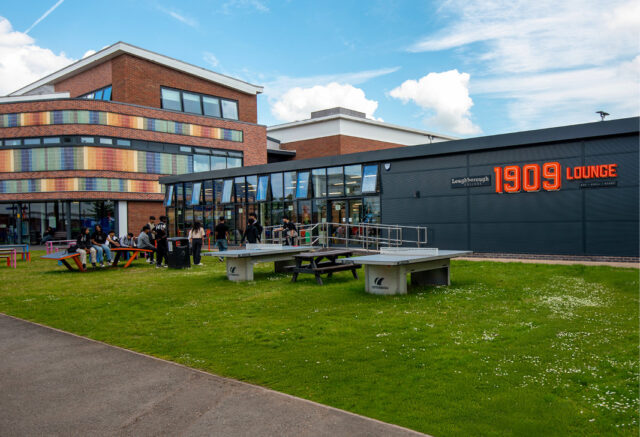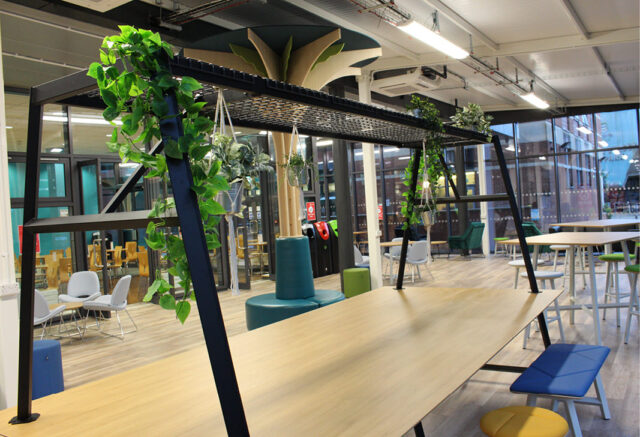In the competitive world of independent education, sixth form provision can either be a real attraction or a significant vulnerability. For prospective pupils and parents, the sixth form experience is about independence, aspiration and a sense of identity, as well as academic outcomes. The physical environment plays a critical role in delivering that.
At independent King’s School, Gloucester, a commissioned review revealed that tired, cramped sixth form facilities were having a measurable impact on behaviour, ambition and even staff morale. Pupils were learning in dimly lit rooms, divided by year group across different floors, with little sense of cohesion or ownership. In response, the school developed a new sixth form vision centred around a flagship building; not as an afterthought, but as a clear statement of ambition and identity.
This is a challenge faced across the sector. Many independent schools operate on historic estates, often prioritising lower school investment or whole-school projects. Yet sixth form pupils are increasingly making consumer-like decisions about their futures.
Around one in five pupils at Year 11 considers moving school for sixth form, attracted by stronger academic results, better facilities, or more tailored pathways. That makes retention just as important as recruitment for independent school sixth forms and both are shaped by the built environment.
What makes a great, independent school sixth form?

In an article on future-proofing independent school sixth forms, all the elements that make up a first-class were considered:
-
- Academic strength and depth (Exciting subjects, teaching in new ways (collaborative lessons, ICT, spaces to work together)
- Stretch and challenge
- Pupils are known, supported and valued as individuals (Year group size and house or form sizes are so important if a sixth form college education is delivered on a much larger scale)
- Pupils are aware of high expectations
- Co-curricular and character education: (Pupil leave as confident, articulate, rounded, resilient. Schools must ensure that every pupil has the opportunity to develop these characteristics.)
- Strong post-18 pathway support (Sixth form is a two-year pathway towards personalised choices post school; university/ apprenticeship/work/further training etc.)
- A strong alumni network
What makes a great, independent school sixth form?
A separate, purpose-built sixth form centre signals independence while still being connected to the life of the school. It allows for seminar-style teaching and collaborative workspaces. It creates a home for co-curricular activity, quiet study and careers support. Most importantly, it gives sixth formers a sense of transition into adulthood, something many schools now recognise as critical to personal development and academic success.
Investing in sixth form space is also an incredibly valuable decision for schools in the independent sector. Questions around retention, prestigious university entry, or mean teaching cost per pupil, are all shaped by how the sixth form performs as a distinct environment.
For many schools, rethinking sixth form space also unlocks practical wins; flexible timetabling, smarter use of existing estate, or improved safeguarding through zoning and access control.
ZONE Design. Build
A dedicated sixth form centre is a powerful statement for any independent school but delivering it through traditional construction can be time-consuming, unpredictable and disruptive to school life. ZONE Design. Build offers a smarter alternative.
Using a fully integrated design and build process, ZONE helps independent schools realise their vision for sixth form facilities more quickly and with greater cost certainty. Unlike the traditional model, where design and construction are handled by separate teams, ZONE brings everything together from the outset. There is one contract, one point of contact and one accountable team working with the school from initial concept through to completion.

This model brings real benefits on the ground. Design, manufacturing and site preparation can happen in parallel, which shortens timelines significantly; ideal for projects that must be completed in school holidays or with minimal disruption during term time. With fewer on-site operations and better coordination, sixth form buildings can be delivered without interrupting day-to-day learning.
For bursars and governors, the financial benefits are equally clear. With early cost visibility, fewer variables and tighter risk control, ZONE’s design-build approach offers better value per square metre than traditional procurement routes.
Crucially, ZONE buildings are designed to sit comfortably within the heritage context of independent schools. Many sites are complex and historically significant. Our building systems can be tailored with external finishes and material choices that complement the surrounding architecture, maintaining the school’s unique identity while delivering modern, functional space. Whether alongside Georgian brickwork or Tudor facades, ZONE facilities provide contrast without compromise, enhancing rather than disrupting the character of the estate.
For independent schools, this means no longer choosing between tradition and progress. With ZONE, they can protect the integrity of their historic estate while meeting the growing expectations of sixth form pupils and their families, delivering a contemporary learning environment that supports academic ambition, personal development and long-term recruitment goals.
Explore our approach at: www.zonedesignbuild.co.uk

